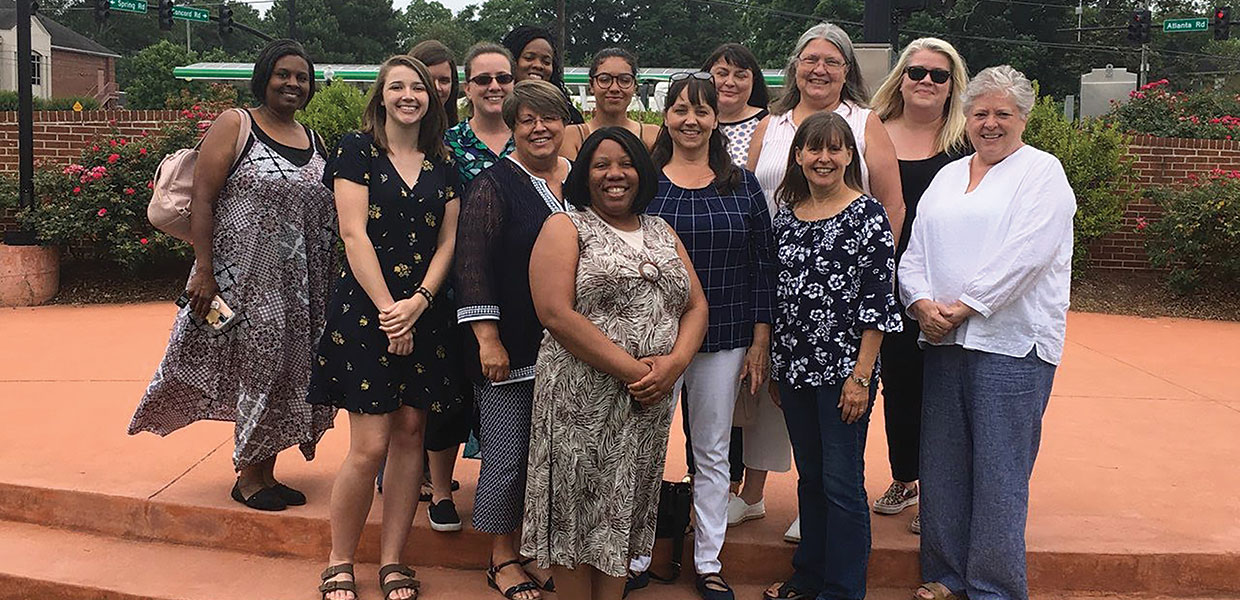
Submitted by: Sabrina Patton
Summer break is a time all teachers (and students) look forward to. Yet, not all of summer is used for rest and relaxation. Many teachers take time to perfect the craft of teaching by attending professional development courses.
Cobb County School System in the Atlanta, Ga., area hosted a Literacy & Inquiry Summit on June 3 and 4, 2019. The theme was “Teaching for Change,” a collaboration of the English Language Arts and Social Studies departments.
The purpose of the summit was to recognize the important role teachers play as educators in reaffirming and supporting students’ civic health, social justice, literacy, and equity. Kim Thompson and Angela Walton, regional education directors, and Krystal Bishop, Southern Adventist University education professor, along with 11 other teachers, were in attendance.
The experience began with inspirational messages of student voices as part of a new program called “Project Soapbox: Amplifying Student Voice.” Students are challenged to stand up and speak out on issues they are passionate about. A teacher guides them through the writing process, and teaches them how to structure their speech in the most effective way. Then they give their speeches using delivery techniques to ensure a powerful, persuasive presentation, thus transforming them into active citizens and leaders. They heard four middle school students present speeches.
The keynote presentation was from author Lester L. Laminack. He proposed the idea that balanced, authentic literature should be mirrors, windows, and doors. When teachers choose texts for their classrooms, students should be able to see themselves, broaden their views, and take action, or maybe change a behavior or thought.
The last keynote presenter was Rutha Mae Harris, a freedom singer who was part of the civil rights movement. She uses music as a way to empower and educate audiences on civil rights issues. Everyone listened intently as she shared experiences where she was arrested and, on occasion, assaulted as she courageously stood up for what she believed in. She moved participants with her powerful contralto voice as she included the audience in some of her songs.
In addition to the keynote presenters, there were more than 50 sessions available to attend: workshops, panel discussions, presentations, and informal collaboration opportunities.
As the teachers attended the different classes, each reflected on how to translate this rich information to their classroom. Valerie Hunt, a teacher from Bowman Hills School in Cleveland, Tenn., says that after attending the class “Creating A Classroom Democracy,” she was inspired with ideas to use in her class meetings, and tools to create a positive, supportive, safe atmosphere for her classroom. Michelle Laney, also a Bowman Hills teacher, says that she plans to incorporate Project Soapbox in her elementary classroom by helping students determine what is important to them, and how to listen to and respect their classmates.
As Adventist teachers, many feel they have a responsibility to teach their students how to apply a Christian view to social and political issues, and how to make a strategic difference in society.
Please keep all Adventist educators in your prayers as they share the Gospel of Christ, and meet social needs as presented in Acts 2 and 4.
Georgia-Cumberland | August 2019



Comments are closed.